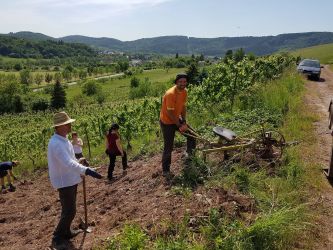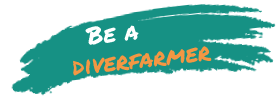Researchers collected information about extraction of bioactive ingredients, fragrances and flavours from intercropped perennial herbs in German organic steep slope viticulture
Following WP8 “Economic assessment at farms and value chains” the German researchers and winemakers have visited the company Flavex Naturextrakte in Rehlingen (Saarland, Germany) (http://www.flavex.com/) to know if the intercropped thyme (Thymus vulgaris L.) and oregano (Origanum vulgare L.) are suitable for extraction as bioactive ingredients, fragrances and flavours.
 The core competence of the medium-sized company Flavex is the gentle production of sensitive plant-based ingredients through the extraction with supercritical carbon dioxide. All products are developed, produced and certified at the company’s site in Rehlingen-Siersburg/Germany near the borders to France and Benelux countries. Today, they belong to the worldwide leading suppliers of CO2 extracts. Many FLAVEX CO2 extracts are certified according to EU Organic Regulation. Thyme and oregano are two of their most processed herbs.
The core competence of the medium-sized company Flavex is the gentle production of sensitive plant-based ingredients through the extraction with supercritical carbon dioxide. All products are developed, produced and certified at the company’s site in Rehlingen-Siersburg/Germany near the borders to France and Benelux countries. Today, they belong to the worldwide leading suppliers of CO2 extracts. Many FLAVEX CO2 extracts are certified according to EU Organic Regulation. Thyme and oregano are two of their most processed herbs.
On January 18, Dr. Gerard (co-founder and co-director of Flavex) and Mr. Quirin (leading purchaser for botanicals) guided and informed the German Diverfarming-team (Trier University and Weingut Dr. Frey) for about three hours. They showed the lab, the warehouse as well as the production hall and informed about products and quality requirements. There was mutual interest in the Diverfarming project and especially in the herbs from the steep slope vineyards at the Saar river. Test extractions and quality checks were agreed to find out if the herbs are suitable for aromatic oil extraction. All participants of that company visit took this as an encouraging step towards an economic valorization of the ecologically valuable intercrops.
Diverfarming is a project financed by the Horizon 2020 Programme of the European Commission, within the challenge of “Food Security, Sustainable Agriculture and Forestry, Marine, Maritime and Inland Water Research and the Bioeconomy”, which counts on the participation of the Universities of Cartagena and Córdoba (Spain), Tuscia (Italy), Exeter and Portsmouth (United Kingdom), Wageningen (Netherlands), Trier (Germany), Pecs (Hungary) and ETH Zurich (Switzerland), the research centres Consiglio per la ricerca in agricoltura e l'analisi dell'economia agraria (Italy), the Consejo Superior de Investigaciones Científicas (Spain) and the Natural Resources Institute LUKE (Finland), the agrarian organisation ASAJA, and the companies Casalasco and Barilla (Italy), Arento, Disfrimur Logística and Industrias David (Spain), Nieuw Bromo Van Tilburg and Ekoboerdeij de Lingehof (Netherlands), Weingut Dr. Frey (Germany), Nedel-Market KFT and Gere (Hungary) and Paavolan Kotijuustola and Polven Juustola (Finland)).










